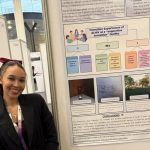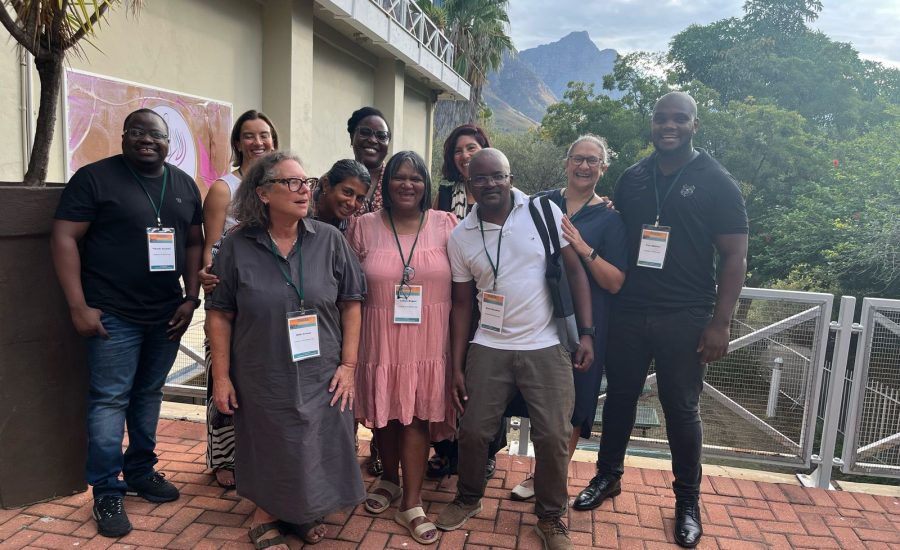
Khayelitsha and Eastern Substructure (KESS) Research day
30 July 2025
Reflections 2025 International AIDS Society Conference: Finding belonging, building resilience, and reimagining a future in research.
25 August 2025LP4GT partners at the PHASA 2025 conference. Second row from left to right: Dr. Takunda Satumba, Ms. Ulla Walmsley, Prof. Asha George, Dr. Phoene Oware, Dr. Tanya Jacobs, Ms. Bronwyn Damon, Mr. Vuyolethu Mjijelwa. First row, left to right: Ms. Nichola Schaay, Ms. Colleen Wagner and Dr. Anam Nyembezi
The promises and pitfalls of working with a co-design approach for advancing health and gender equality: Perspectives from programme implementers, public health researchers and funders
Globally and in South Africa, young people face significant sexual and reproductive health (SRH) challenges. In South Africa, young people (15-24) represent a significant proportion of people living with HIV and women were disproportionately affected. One in three women experience physical/sexual violence in their lifetime. These outcomes are a manifestation of deep-rooted issues such as harmful gender norms, unequal gender power relations, and systemic inequalities.
A gender transformative approach, which seeks to challenge and change negative gender norms holds potential to address some of these challenges.
Co-design, a process that involves collaboration between stakeholders in designing and implementing solutions to a pre-defined problem can support effective partnerships in the health sector and beyond to integrate a gender transformative approach into SRH programmes.
Implementing co-design is however complex. Partners involved in a codesign process have to navigate institutional norms and entrenched power structures, and various contextual factors operating at interpersonal, community, organisational and societal levels.
In this article we share insights from the three partner organizations on lessons learned while engaging in co-design to integrate gender into My Journey. These insights were presented at an organized session during the 2025 PHASA Conference.
The My Journey programme delivers comprehensive biomedical, behavioural and structural support services to adolescents and young people (AYPs) aged 10-24 in South Africa. Over the last three years, three organizations – The School of Public Health (SOPH) a research and learning institution, NACOSA the My Journey grant managing partner and HOPE Africa as the My Journey programme implementers in Klipfontein sub-district – established a collaborative community-based learning platform: The Learning Partnership for Gender Transformation(LP4GT). The aim of this platform was to use co-design to support dialogue, exchange and capacity strengthening to integrate a gender transformative approach into the My Journey programme.
Key insights on using co-design to integrate gender within My Journey
Ms. Colleen Wagner, a grant manager at NACOSA emphasized the need to develop partners’ capacity and understanding of gender, how it affects them and society at different levels. Ms. Bronwyn Damon, a programme manager at Hope Africa, highlighted the difficulty of creating time for learning and reflection – which are essential elements of a co-design process- while implementing My Journey within a pressurized environment.
Ms. Wagner pointed out potential pitfalls in co-design processes, including unclear expectations among partners and overestimating the speed at which outcomes can be seen. These may lead to disappointment and frustration.
This was echoed by Ms. Ulla Walmsley from SOPH, whose PhD project investigates what it takes to integrate gender into a pre-existing SRH intervention, i.e., My Journey. She emphasized that co-design is an iterative rather than linear process. Ms. Damon underscored this, noting that clarifying time commitments and maintaining flexibility among partners participating in a co-design process is crucial. Ms. Wagner noted that this is only possible if there are dedicated funding streams that support co-design.
Speaking about what it takes to implement a co-design approach to integrate gender, Ms. Walmsley stressed the importance of strong commitment from partners; building positive relationships that are based on trust, good project management skills, and engaging in ongoing reflection on power dynamics. Commenting on the question of power, Ms. Wagner cautioned that ignoring historical power imbalances among individuals and partners involved in co-design may perpetuate existing health disparities and undermine co-design processes.
Listen to Ms. Coleen Wagner’s reflections on co-design from a grant manager’s perspective
Listen to Ms. Ulla Walmsley’s reflections on co-design from a researcher’s perspective
Evidence on the use of co-design to integrate gender in health programmes has been mapped in a forthcoming scoping review by Ms. Walmsley titled ‘Participatory design partnerships for gender and health in low and middle-income countries: a scoping review (currently under review). Findings from this review were also presented at the 2025 PHASA conference.
At the 2025 PHASA conference, the LP4GT team also shared lessons on what it takes to integrate gender into these two social and behaviour change programmes within My Journey – One Youth Can and Grassroots Soccer – which target adolescent boys and young men. These were presented by Dr. Tanya Jacobs who noted the importance of understanding the social contexts that facilitators of these programmes come from and operate in as well as their own process of gender socialisation. She further highlighted that facilitators require on-going capacity strengthening and support. This work is now published in a special supplement in the African Journal of Reproductive Health. The supplement also highlights experiences of integrating a gender transformative approach in sexual, reproductive, maternal, child and adolescent health programmes in various contexts across sub-Saharan Africa.

